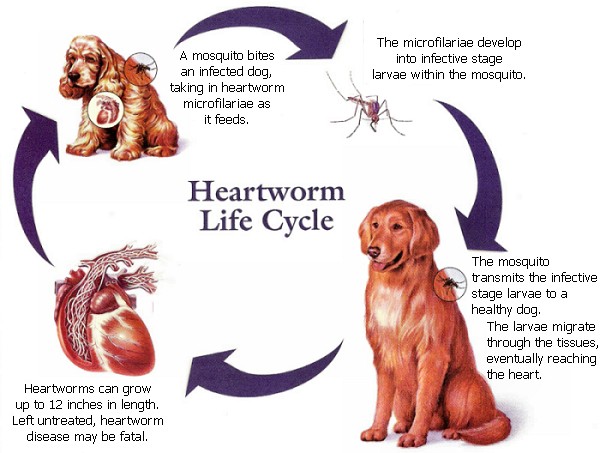Heartworm Prevention in Dogs
Don't take it lightly: Conventional preventatives are still the best way to protect your dog.
Article by Mary Straus, published in the Whole Dog Journal, March 2006

Also see these related articles:
- Heartworm Treatment
- Time to Step It Up (Update on heartworm resistance WDJ July 2011)
- Are Heartworms Developing Resistance to Preventatives? (WDJl March, 2011)
See also:
Photo of Raven, a Scottish Deerhound who was infected by heartworms. Read her story below.
Introduction
People have learned of the benefits of a natural diet and limited vaccinations, and have seen the health improvements in their dogs from these changes. Now, many want to know if they can discontinue administering heartworm preventatives to their dogs, or whether those can be replaced by natural options.
Heartworm preventatives can cause serious side effects in some dogs, including depression, lethargy, vomiting, anorexia, diarrhea, dilation of the pupil, loss of balance, staggering, convulsions, and hypersalivation. Some dogs are especially prone to side effects from ivermectin, the main ingredient in one of the most widely used heartworm preventatives. Also, some of the preventatives are combined with drugs aimed at killing other pests such as fleas, mites, roundworms, and hookworms.
On the other hand, heartworm can be a devastating disease. Dogs with moderate or severe infestations display a chronic cough and can’t engage in much activity, as worms choke their heart and major blood vessels, reducing their blood (and thus oxygen) supply. The disease often leaves its victims incapacitated, incapable of doing much more than a slow walk without gasping for air, and kills many dogs. Even the treatment for heartworm disease can be deadly, regardless of which method is used, so it is important to understand the risks that you take if you choose not to give your dog heartworm preventative.
In fact, most (certainly not all) holistic veterinarians consider the use of pharmaceutical preventatives to be less harmful than a heartworm infection.
Some argue, but . . .
As the co-moderator of an e-mail list on dog health and nutrition, I frequently see people allege that as long as you have a healthy dog, feed a raw diet, and do not over vaccinate, your dog will not get heartworms. If only this were true! These measures may help to some degree, but they are not foolproof. The only way to know for sure that your dog is protected is to give heartworm preventatives.Christie Keith, who lives in an area of Northern California where heartworm is relatively uncommon and has raised Scottish Deerhounds naturally for over 19 years, learned this the worst way.
“I went 16 years not using any form of allopathic preventative on my dogs. At the end of that 16-year period, on routine testing, I found that two of my dogs were heartworm-positive," says Keith. "One of the positive dogs was Raven, who is a deerhound I bought from another breeder. She came to me at 17 weeks with bad ear infections and severe allergies, and no one could argue that Raven was healthy or had a normal immune system.

”In contrast, my dog Bran (pictured at right) was a third-generation, naturally reared dog of my own breeding. He was unvaccinated other than minimally for rabies. He was raw-fed. His mother and her mother were raw-fed and unvaccinated other than minimally for rabies. He was, by any definition available, extremely healthy and robust. He had never been sick a day in his life.”
Christie successfully treated both her dogs, though Raven almost died of a pulmonary embolism during treatment. Bran became heartworm-free after several months of using the “slow kill” method of heartworm treatment, with no sign of any adverse effects. Unfortunately, Bran died of acute renal failure not long after that. Necropsy results were inconclusive, showing that Bran had glomerulonephritis, but not why.
In her research to try to find the cause of her dog’s death, Christie discovered that glomerulonephritis is a potential side effect of heartworm infection. Although she and her vets eventually came to the conclusion that Bran’s renal failure was caused by Lyme nephritis rather than heartworm disease, it was disturbing to realize that heartworms can affect more than the heart and lungs.
“I have no intention of ever living through what I lived through with Raven and Bran. I can't keep silent when I see people starting to believe that healthy animals don't get heartworm and that we can blithely forgo using preventatives if we don't overvaccinate and feed raw. It's just not so. And it's not realistic to rely on the health and natural disease resistance of our dogs to protect them from a threat that they are exposed to frequently, as is the case in heartworm-endemic areas.”
“No creature is in a static state of health 24 hours a day, 7 days a week. If our dogs are frequently exposed to an infectious parasite, eventually they may well succumb to it, no matter how healthy they are normally.”
"Alternative" preventatives?
Some holistic practitioners recommend various herbal or homeopathic preparations for heartworm prevention, and anecdotal evidence from some dog owners can be found on many discussion lists devoted to natural dog care. However, consumers should be aware that none of these alternatives have been studied for safety or efficacy, nor are there any studies indicating that they are effective at protecting against heartworm infection. In addition, some herbal dewormers, such as wormwood and black walnut, are potentially toxic when used at dosage levels needed to control intestinal parasites. Holistic veterinarian Dr. Susan Wynn, author of Emerging Therapies: Using Herbs and Nutraceuticals in Small Animals (AAHA Press, 1999) and other books, in reference to herbal dewormers for intestinal parasites, said in a chat on doghobbyist.com, “Use a conventional dewormer. They are safer - MUCH - and more effective, than herbal dewormers.”Some holistic practitioners advocate the use of homeopathic nosodes for heartworm prevention. Again, there are no studies indicating that they are effective. In his book, Homeopathic Care for Cats and Dogs, Don Hamilton, DVM, says “I do know of some cases where the nosode did not protect, however. I believe it does offer some protection, though it may be incomplete. . . . If you decide to try the nosode, you must understand that its effectiveness is currently unknown.”
What is known, is that conventional heartworm preventatives are the best form of protection currently available. Fortunately for those of us who worry about the side effects of using the conventional drug preventatives, there are numerous ways you can minimize their use and still protect your dog. I’ll discuss these methods after introducing the most common preventatives.
Conventional preventatives
The two most common (and generally considered safe) heartworm preventative ingredients used today are ivermectin (used in Heartgard by Merial, and other products) and milbemycin oxime (used in Interceptor by Novartis).There is also an older, daily heartworm preventative available, diethylcarbamazine or DEC. For many years, this drug was available from Pfizer as “Filaribits.” Though Filaribits has been discontinued, you can still find generic versions of DEC.
DEC is very safe in terms of side effects, but can be life-threatening if given to a heartworm-infected dog with circulating microfilariae, due to the risk of a rapid die-off of the microfilariae and resulting anaphylactic reaction. Also, missing just one or two days of medication can allow your dog to become infected. If you use DEC, it is essential that you test for heartworms before starting this drug, and every six months while using it. (Avoid Filaribits Plus, which has oxybendazole added to control intestinal parasites and has been known to cause liver damage.)
There are other heartworm products that include drugs for other purposes. Heartgard Plus adds pyrantel to control intestinal parasites, including roundworms and hookworms. Adult dogs rarely have problems with roundworms, but if your yard has been infested with hookworms, this product might be good to use until the hookworms have been eliminated.
Sentinel is a combination of the products Interceptor and Program (lufenuron). Lufenuron is a medication that acts to prevent fleas from reproducing; it's not a pesticide and does not kill fleas or keep them from biting your dog. This may be helpful for a short time if you have a flea infestation, and employ several nontoxic methods to get the flea problem under control, such as diatomaceous earth to treat the house and nematodes to treat the yard.
I'm less enthusiastic about selamectin (found in Revolution by Pfizer), a more recent entry to the market. Selamectin is a topical product that is also indicated for fleas, one kind of tick, ear mites, and the mites that cause sarcoptic mange. While this may well be great if your dog had mange, fleas, ticks, and ear mites, I strongly prefer drugs with a minimal and targeted action over ones with broad-spectrum activity.
The injectable product moxidectin (ProHeart 6 by Fort Dodge) has been withdrawn from the US market due to numerous reports of adverse effects, including death. I do not recommend the use of injectable heartworm preventatives at all, as there is no way to remove them from your dog’s system if there is a bad reaction, and the time release drug will continue to affect your dog for months.
Temperature and timing
UpdateBased on new information regarding possible reduced heartworm preventative efficacy, I now feel it’s best to give heartworm preventives year-round, not only for better protection against infection, but also to ensure that the manufacturer will pay for treatment should your dog become infected with heartworms. See New Information Regarding Heartworm Resistance for details. |
First, it is not necessary to give heartworm preventatives year-round in most parts of the country. Heartworm development in the mosquito is dependent upon environmental temperatures. Heartworm larvae cannot develop to the stage needed to infect dogs until temperatures have been over 57 degrees Fahrenheit (14 degrees Centigrade), day and night, for at least one to two weeks. The amount of time it takes will vary depending on how warm it is: the warmer the temperatures, the faster the heartworm larvae develop.
If temperatures drop below that point at any time during the cycle, development may be prevented, but I wouldn’t rely on this. Temperatures can vary according to where the mosquito lives, and may be warmer under the eaves of houses or in other protected areas than the general ambient temperature.
Heartworm preventatives work by killing heartworm larvae that have already infected the dog, but before they can mature into adult worms that cause damage. When you give your dog heartworm preventative, you are killing any larvae that have infected your dog within the last one to two months. Any larvae that have been in your dog longer than 60 days are more likely to survive the treatment and go on to mature into adult worms.
Also, your dog may become infected the day after you give heartworm preventative, the drugs do not provide any future protection at all.
If your goal is to provide full protection for your dog with minimal drug administration, you'll have to monitor the temperatures in your area. Mosquitoes may be capable of transmitting heartworm larvae to your dog around two weeks after your local temperature has stayed above 57 degrees Fahrenheit day and night.
Give the season’s first dose of preventative four to six weeks after that to destroy any larvae that infected your dog during that time. Thus, the first dose should be given six to eight weeks after daytime and nighttime temperatures first exceed 57°F. Continue to give the preventative every four to six weeks, with the last dose given after temperatures drop below that level on a regular basis.
For some parts of the country, this can mean giving preventatives only between July and October, while in others, where temperatures remain mild all year, they may have to be given year-round.
If you do not give your dog heartworm preventatives (because the area you live in is very low risk or because the temperatures are not right for heartworms to develop), and then take your dog to a an area where heartworm is a problem, you must treat him with heartworm preventative upon your return to protect him.
Dosage amounts
UpdateBased on new information regarding possible reduced heartworm preventative efficacy, I strongly advise against giving lower than recommended dosages of heartworm preventatives. See New Information Regarding Heartworm Resistance for details. |
Milbemycin oxime, the active ingredient in Interceptor, has been approved by the FDA at one-fifth the regular dosage to kill heartworms only, without controlling intestinal parasites, including roundworms, whipworms and hookworms. Novartis received FDA approval for a product, "Safeheart", with this lowered dosage of milbemycin, but it appears that they don't intend to market it. (You can read the FDA approvals showing that milbemycin oxime will control heartworm at one-fifth the dosage found in Interceptor on the FDA’s web site; see "Resources" below).
The actual recommended dosage of milbemycin oxime for heartworm prevention only is 0.05 mg per pound of body weight (0.1 mg per kg). Contrast this with the recommended dosage of Interceptor for control of heartworm and intestinal parasites: 0.23 mg milbemycin oxime per pound (0.5 mg/kg) of body weight. Heartworm can be prevented at a much lower dose than that needed to control intestinal parasites.
Safeheart contains 2.3 mg of milbemycin oxime for dogs from 2 to 50 pounds, and 5.75 mg for dogs 50 to 125 pounds. Interceptor contains 2.3 mg for dogs up to 10 pounds, and 5.75 mg for dogs 11 to 25 pounds. So if your dog weighs more than 50 pounds, you can give the Interceptor for dogs 11-25 pounds, otherwise you can use the one for dogs up to 10 pounds.
Frequency of preventatives
UpdateBased on new information regarding possible reduced heartworm preventative efficacy, I strongly advise against giving heartworm preventives less often than monthly. See New Information Regarding Heartworm Resistance for details. |
The FDA approvals cite studies showing that Heartgard, Interceptor and Revolution provide protection beyond 30 days. If you are very good about remembering to give medications, and you can watch your dog after administering the pill to be sure that it is not spit out or later vomited, it may be safe to use heartworm preventatives less frequently than every 30 days. Dosing your dog every 45 days is a conservative way to stretch your dog's dosage schedule.
The original FDA approval for Heartgard states, “The target dose of 6 mcg per kilogram of bodyweight was selected from titration study 10855 as the lowest dose providing 100% protection when the dosing interval was extended to 60 days to simulate a missed-dose circumstance.”
The drug manufacturers’ pre-approval tests indicate that even longer dosing schedules may convey protection from heartworm – but I wouldn’t stake my dogs’ well-being on dosage schedules extending beyond a somewhat arbitrary 45 days.
The original FDA approval for Heartgard states, “The target dose of 6 mcg per kilogram of bodyweight was selected from titration study 10855 as the lowest dose providing 100 percent protection when the dosing interval was extended to 60 days to simulate a missed-dose circumstance.”
The original FDA approval for Interceptor states, “Complete (100%) protection was achieved in dogs treated at 30 days post infection, with 95% protection at 60 and 90 days.” This does not apply to Safeheart, which was tested only at a 30 day dosing interval.
The original FDA approval for Revolution states, “Selamectin applied topically as a single dose of 3 or 6 mg/kg was 100% effective in preventing the maturation of heartworms in dogs following inoculation with infective D. immitis larvae 30 or 45 days prior to treatment, and 6 mg/kg [the recommended dosage amount] was 100% effective in preventing maturation of heartworms following inoculation of infective larvae 60 days prior to treatment.”
Splitting pills
The issue of splitting heartworm pills comes up frequently. I have spoken to representatives from Merial (maker of Heartgard) and Novartis (maker of Interceptor). Both said that the active ingredients are mixed into their products before the pills are formed, and therefore should be evenly distributed (though they cannot guarantee this). However, both manufacturers advise against pill splitting.Splitting pills is inexact and may result in the dog getting less or more of the medication. If you do decide to split the pills, use a pill splitter (available at any drug store) and do not try to give the minimum dosage, as you cannot be certain that your dog will get enough of the medication.
No guarantees
UpdateBased on new information regarding possible reduced heartworm preventative efficacy, I strongly advise against giving heartworm preventives less often than monthly, or giving lower than recommended dosages. It’s best to give heartworm preventives year-round as well, not only for better protection against infection, but also to ensure that the manufacturer will pay for treatment should your dog become infected with heartworms. I also recommend annual testing for dogs, especially for those who live in heartworm-endemic areas, even if you give preventives all year round. Manufacturers will only honor preventative guarantees when products are purchased from a veterinarian and given year-round according to label instructions. At least two online sites offer their own guarantees against product failures: 1-800-PetMeds, PetCareRx See New Information Regarding Heartworm Resistance for details. |
It is important to understand the risk that heartworm infection poses to your dog. Rather than relying on unproven alternative methods of heartworm prevention, or the unreliable method of depending on your dog’s health to keep him from getting infected, all of the methods discussed above will offer you ways of safely reducing your usage of conventional heartworm preventatives, while still giving your dog complete protection from heartworm infection.
I regret that I no longer have much time to respond to questions. See my Contact page for more information. My name is Mary Straus and you can email me at either or

